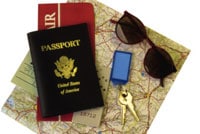Malaria and Travelers for U.S. Residents
This information is intended for travelers who reside in the United States. Travelers from other countries may find this information helpful; however, because malaria prevention recommendations and the availability of antimalarial drugs vary, travelers from other countries should consult health care providers in their respective countries. For more health recommendations for international travel, visit the CDC Yellow Book.
Every year, millions of US residents travel to countries where malaria is present. About 2,000 cases of malaria are diagnosed in the United States annually, mostly in returned travelers.
Travelers to sub-Saharan Africa have the greatest risk of both getting malaria and dying from their infection. However, all travelers to countries where malaria is present may be at risk for infection.

Obtain a detailed itinerary including all possible destinations that may be encountered during the trip and check to see if malaria transmission occurs in these locations. The Malaria Information by Country Table provides detailed information about the specific parts of countries where malaria transmission does or does not occur. It also provides additional information including the species of malaria that occur there, the presence of drug resistance, and the specific medicines that CDC recommends for use for malaria prevention in each country where malaria transmission occurs on CDC’s Malaria maps.
Prevention of malaria involves a balance between ensuring that all people who will be at risk of infection use the appropriate prevention measures, while preventing adverse effects of those interventions among people using them unnecessarily. An individual risk assessment should be conducted for every traveler, taking into account not only the destination country, but also the detailed itinerary, including specific cities, types of accommodation, season, and style of travel. In addition, conditions such as pregnancy or the presence of antimalarial drug resistance at the destination may modify the risk assessment.
Based on the risk assessment, specific malaria prevention interventions should be used by the traveler. Often this includes avoiding mosquito bites through the use of repellents or insecticide treated bed nets, and specific medicines to prevent malaria.
More on: Preventing Mosquito Bites While Traveling
If malaria prevention medicines will be needed for the traveler, the Malaria Information by Country Table lists the CDC-recommended options. For many destinations, there are multiple options available. Factors to consider are the patient’s other medical conditions, medications being taken (to assess potential drug-drug interactions), the cost of the medicines, and the potential side effects.
More on: Tips on Choosing the Right Drug for an Individual Traveler
The Drugs for Malaria Prevention table provides prescription dosing information for both adults and children.
In some countries (including those with malaria risk), drugs may be sold that are counterfeit (“fake”) or substandard (not made according to United States standards). Such drugs may not be effective. Antimalarial drugs should always be purchased before traveling overseas!
For details and specific warnings, see Counterfeit and Substandard Antimalarial Drugs

This picture shows some things that travelers can use to protect themselves against malaria: malaria pills; insect repellent; long-sleeved clothing; bednet; and flying insect spray. (Not shown, but also protective: air conditioned or screened quarters.)
The interventions used to prevent malaria can be very effective when used properly, but none of them are 100% effective.
Malaria is always a serious disease and may be a deadly illness. Travelers who become ill with a fever or flu-like illness either while traveling in a malaria-risk area or after returning home (for up to 1 year) should seek immediate medical attention and should tell the physician their travel history.
Travelers who are assessed at being at high risk of developing malaria while traveling should consider carrying a full treatment course of malaria medicines with them. Providing this reliable supply of medicine (formerly referred to as standby or emergency self-treatment) will ensure that travelers have immediate access to an appropriate and high quality medicine if they are diagnosed with malaria while abroad. Depending on the medicine they are using for prevention, this could either be atovaquone/proguanil or artemether/lumefantrine.
More on: Malaria Treatment (United States)
Travelers are often surprised to learn that even if they adhered to all of the prevention advice and did not become sick with malaria, recent travel to a place where malaria transmission occurs is an exclusion criterion for blood donation.